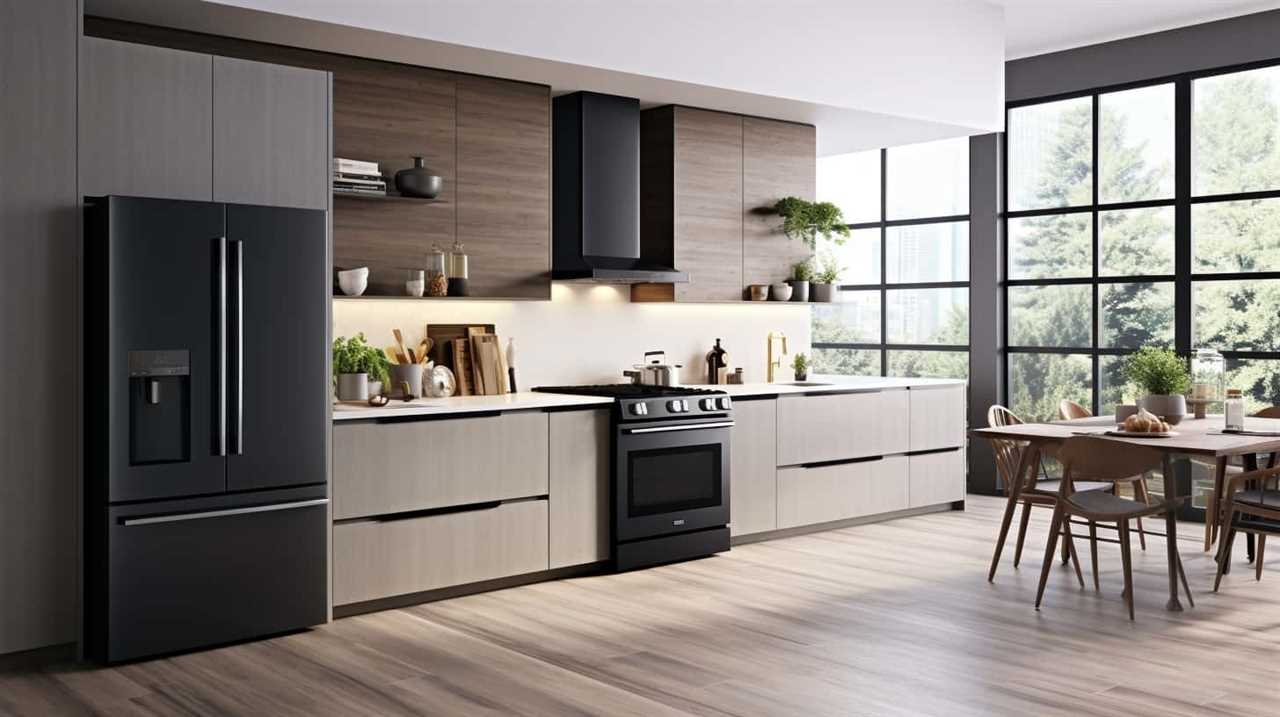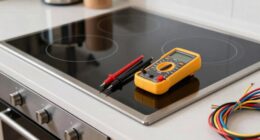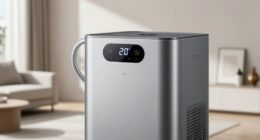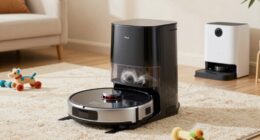Slow cookers generally use between 150 and 300 watts during operation, so they’re more energy-efficient than ovens or stovetops for long cooking times. Factors like size, filled capacity, and cooking duration influence how much energy they consume. Using the right size and avoiding unnecessary lid lifts help save power. Since they maintain steady heat, they can help lower energy costs overall. If you want to understand how to optimize your slow cooker’s efficiency, keep exploring these tips.
Key Takeaways
- Slow cookers typically use 150-300 watts, consuming about 1-1.5 kWh for an 8-hour session.
- Proper sizing and filling the cooker halfway optimize energy efficiency.
- Using low settings, timers, and minimizing lid openings reduce unnecessary energy use.
- Slow cookers consume less energy than ovens or stovetops, making them more efficient for long cooking periods.
- Tracking wattage and cooking habits helps plan and manage energy costs effectively.
How Much Power Do Slow Cookers Typically Use?

Slow cookers are known for their energy efficiency, typically consuming between 150 and 300 watts during operation. This low power usage makes them a cost-effective choice for cooking meals. When you use a slow cooker, it uses less energy than many appliances like ovens or stovetops. The actual energy consumption depends on factors like the size of the cooker and the cooking time. Smaller models tend to use less power, while larger ones may draw closer to the higher end of that range. You can expect your slow cooker to use around 1 to 1.5 kilowatt-hours for a typical 8-hour cooking session. This efficiency helps you save on your energy bill while still preparing delicious, healthy meals. Additionally, understanding AI security can help ensure your smart kitchen devices operate safely and reliably. Energy consumption varies based on usage patterns and device specifications, so being aware of these factors can help optimize your cooking routines. Moreover, selecting models with energy-saving features can further reduce operational costs and enhance efficiency. A good understanding of energy use in appliances can also guide you in choosing the most efficient slow cooker for your needs.
Factors That Affect Energy Consumption in Slow Cookers
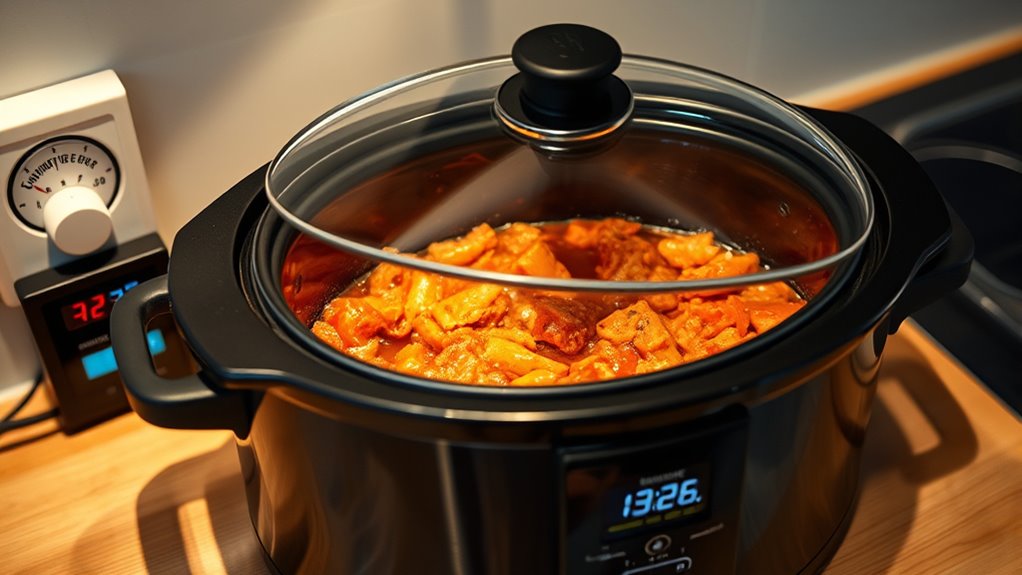
Your slow cooker’s size and capacity can influence how much energy it uses, with larger models often consuming more power. The length of cooking time also plays a role, as longer durations typically increase energy consumption. Understanding these factors helps you make more efficient choices for your cooking needs. Additionally, choosing energy-efficient models with vetted features can further reduce overall power usage. Selecting appliances with energy-saving technology can lead to significant long-term savings. Incorporating energy-efficient design principles can optimize the appliance’s performance and minimize waste. Furthermore, clutter-free environments can make kitchen tasks more efficient, indirectly reducing energy use. Using a power meter to monitor your slow cooker’s actual energy consumption can provide insights that help improve efficiency further.
Size and Capacity
The size and capacity of a slow cooker considerably influence how much energy it consumes during operation. Larger models typically require more power because they have bigger heating elements and a greater volume to heat. If you use a slow cooker that’s too big for your recipe, you might waste energy keeping the excess space warm. Conversely, a smaller cooker used for large meals can strain the appliance and increase energy use if it struggles to maintain temperature. Choosing the right size guarantees efficient energy use. Keep in mind that filling the cooker halfway or more helps heat the contents evenly, reducing unnecessary energy consumption. Proper size selection ensures you’re not wasting power on unneeded space or overworking the appliance. Additionally, understanding energy consumption patterns can help you select the most efficient model for your needs, especially considering how narcissistic behaviors can influence household dynamics and energy use patterns. Furthermore, employing energy-efficient techniques such as preheating or using the correct settings can further optimize your slow cooker’s performance and reduce power usage. Being aware of energy-saving tips can also contribute to lower utility bills and a more environmentally friendly cooking routine.
Cooking Duration
Cooking duration substantially impacts how much energy your slow cooker uses because longer cooking times require the appliance to remain active for extended periods. The longer you cook your food, the more energy it consumes, especially if you use high or medium heat settings. Shorter cooking times, such as those on low settings, generally use less energy, making your appliance more efficient. Additionally, effective communication between partners can help in planning optimal cooking times to maximize energy savings. Moreover, selecting appropriate cooking settings based on the recipe can further optimize energy use. However, keep in mind that some recipes need longer cook times to develop flavors fully. To save energy, plan your meals to cook just as long as necessary. You can also use timers or switch to low settings when possible. By managing cooking duration wisely, you can prevent unnecessary energy waste while still preparing tasty, fully cooked meals. Additionally, understanding how energy use varies with cooking time can help you make more informed choices to optimize efficiency. Being aware of cooking time and energy consumption allows you to better balance meal quality with energy savings.
Comparing Slow Cookers to Other Cooking Appliances

When comparing slow cookers to other appliances, you’ll notice differences in energy efficiency and power use. Some devices consume more energy but cook faster, affecting overall energy costs. Understanding how cooking time impacts consumption helps you choose the most efficient option for your needs.
Energy Efficiency Differences
Have you ever wondered how slow cookers compare to other kitchen appliances regarding energy efficiency? Generally, slow cookers use less energy than ovens or stovetops because they operate at lower temperatures for longer periods. Unlike microwave ovens, which heat food quickly with high energy use, slow cookers provide steady heat with minimal power consumption. While an oven might consume more electricity in a short burst, a slow cooker maintains a consistent, energy-efficient temperature over several hours. This makes slow cookers particularly effective for long, slow cooking processes. Overall, they tend to be more energy-efficient than many traditional appliances, helping you save electricity and reduce costs while preparing meals.
Power Consumption Variations
Although slow cookers are known for their energy efficiency, their power consumption can vary markedly when compared to other appliances. For example, a typical slow cooker uses between 70 and 150 watts during operation, depending on the size and temperature setting. In contrast, an oven consumes around 2000 to 5000 watts, while a microwave uses about 600 to 1200 watts. To cook the same meal, you might spend less energy with a slow cooker because it maintains a steady, low temperature over a longer period. However, if you use a smaller slow cooker or set it to a higher temperature, your energy use can increase. Comparing appliances directly highlights how slow cookers generally consume less power, but variations depend on your specific model and cooking habits.
Cooking Time Impact
How does cooking time influence energy consumption in slow cookers compared to other appliances? Slow cookers use relatively low power over extended periods, making them energy-efficient for long recipes. While a standard oven or microwave heats food quickly, they often consume more energy in a shorter time. For example, an oven might run for 1 hour, using more energy overall than a slow cooker that cooks the same meal for 6-8 hours at a lower power. If you plan to cook something slowly, a slow cooker minimizes energy use by maintaining steady, low heat. Conversely, shorter cooking times with appliances like microwaves consume less energy overall. Understanding this helps you choose the right appliance based on cooking duration and energy efficiency.
Estimating Your Slow Cooker’s Energy Costs
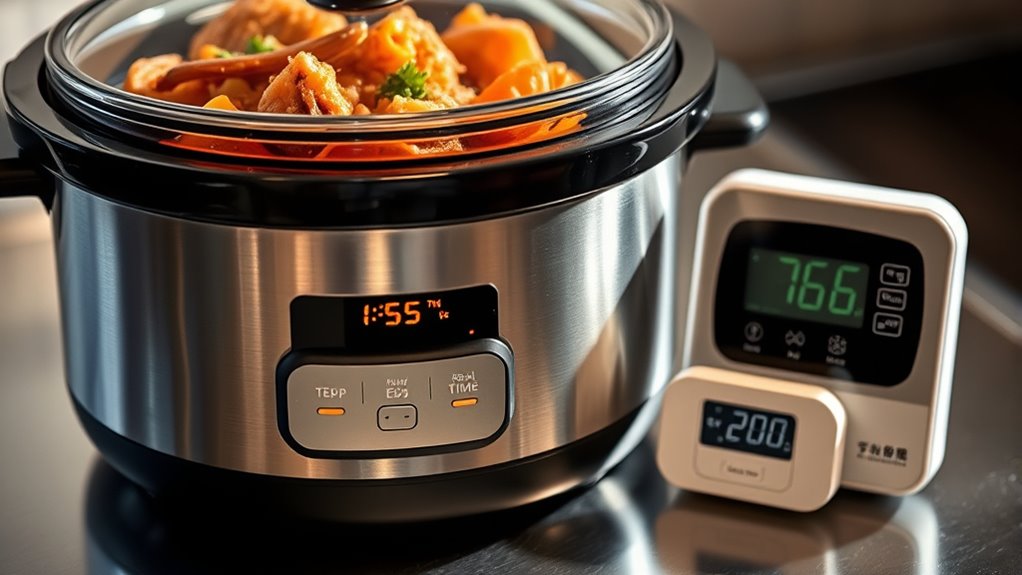
Estimating your slow cooker’s energy costs is straightforward when you understand its power consumption and usage patterns. First, check your model’s wattage, usually found on the label. Then, note how long you typically cook. Use this formula:
| Power (Watts) | Cost Calculation |
|---|---|
| Wattage * Hours / 1000 | (Wattage * hours) / 1000 * kWh rate |
For example, a 200-watt cooker used for 6 hours at $0.12 per kWh costs about $0.14. Keep in mind, energy use varies with cook time and settings. By tracking your cooking habits and knowing your appliance’s wattage, you can estimate your monthly costs more accurately and plan your energy budget effectively.
Tips for Reducing Energy Use While Cooking

By adopting simple strategies, you can cut down on your slow cooker’s energy consumption without sacrificing the quality of your meals. First, avoid opening the lid unnecessarily, as each peek releases heat and prolongs cooking time. Use the right-sized cooker for your recipe; a smaller cooker uses less energy and heats food evenly. Plan to cook larger batches and freeze leftovers to save energy in future meals. When possible, start cooking on high for a short period, then switch to low to finish slowly—this can reduce overall energy use. Also, trim excess fat from ingredients, which helps food cook faster. Lastly, keep the cooker’s lid clean and in good condition to guarantee ideal heat retention. These simple tips make your cooking more efficient and eco-friendly.
Choosing an Energy-Efficient Slow Cooker

Choosing an energy-efficient slow cooker begins with understanding the features that impact its power consumption. Focus on these key aspects:
Opt for slow cookers with adjustable settings, good insulation, and appropriate size to save energy and enhance efficiency.
- Size – Smaller models use less energy, so select a size that fits your typical cooking needs without excess capacity.
- Temperature Settings – Look for slow cookers with adjustable temperature controls to avoid unnecessary energy use during lower or off-peak settings.
- Insulation and Lid Design – Good insulation and tight-fitting lids help retain heat, reducing the energy needed to maintain cooking temperatures.
Best Practices for Optimal Cooking Performance
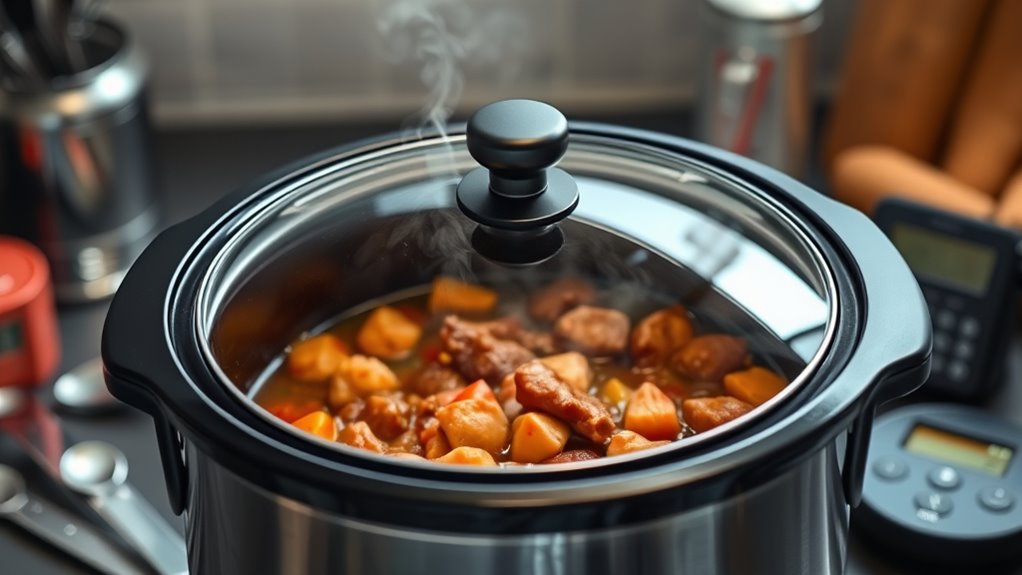
To achieve the best cooking results with your slow cooker, it’s essential to follow certain practices that optimize performance and energy efficiency. Always use the correct size of slow cooker for your recipe; a smaller cooker wastes energy, while a larger one can dilute flavors. Avoid lifting the lid frequently, as this releases heat and increases cooking time. Instead, check dishes toward the end of cooking, and use a timer or setting to prevent overcooking. Cut ingredients into uniform sizes to ensure even cooking and save energy. Use the lid properly—keeping it on traps heat and reduces cooking time. Finally, plan your recipes to cook efficiently in a single session, minimizing the need for additional energy use. Following these tips helps you cook better and save energy.
Environmental Impact of Using Slow Cookers

Using slow cookers with proper practices not only improves your cooking but also reduces their environmental footprint. By choosing energy-efficient models, you minimize electricity consumption and lower your carbon emissions. Additionally, cooking in bulk saves energy over multiple smaller meals, decreasing overall resource use. Finally, using a timer or turning off your cooker once food is done prevents unnecessary energy waste. These habits contribute to a greener kitchen and help combat climate change. Here are some ways to reduce your slow cooker’s environmental impact:
- Select models with high energy efficiency ratings.
- Cook larger portions to maximize energy use.
- Turn off the appliance promptly after cooking ends.
Incorporating these practices makes your cooking more sustainable and environmentally friendly.
Frequently Asked Questions
Can Using a Slow Cooker Save Energy Compared to Traditional Stovetop Cooking?
Using a slow cooker can definitely save energy compared to stovetop cooking. You operate it on low or medium settings, which consume less power over a longer period. Unlike stovetop methods that require high heat and continuous energy, slow cookers use consistent, low energy, making them more efficient for preparing meals. Plus, they keep heat contained, reducing additional cooling needs and overall energy costs.
Do Different Brands of Slow Cookers Vary Significantly in Energy Efficiency?
You might wonder if different brands of slow cookers vary in energy efficiency. Generally, they do, as some brands use more advanced insulation or energy-saving features. To verify you’re choosing an efficient model, check the energy ratings and user reviews. While minor differences exist, your overall energy savings depend more on how you use the cooker, like cooking at lower temperatures or making full loads, rather than just brand alone.
How Does the Size of a Slow Cooker Impact Its Energy Consumption?
Imagine the surprise when you realize that the size of your slow cooker can dramatically impact your energy bill. Larger models use more power simply because they heat more space, but they often cook faster and more evenly. Smaller ones save energy, yet might take longer to cook your favorite recipes. So, when choosing, think about what size suits your needs—and how it might influence your energy consumption in the process.
Is It More Energy-Efficient to Cook Food for Longer or Shorter Periods?
You might wonder if cooking food longer or shorter saves more energy. Generally, shorter cooking times use less energy since the appliance runs for less time. However, slow cookers are designed to be energy-efficient during longer, low-temperature cooking. To optimize energy use, plan meals that benefit from slow cooking and avoid unnecessary extended durations. Ultimately, cooking for the minimum effective time helps conserve energy while still preparing tasty meals.
Can Using a Slow Cooker Reduce Overall Household Energy Bills?
Using a slow cooker can reduce your overall household energy bills by using less power compared to traditional ovens or stovetops. It conserves energy through low, steady heat and requires less time overall, especially if you cook in bulk. You save money and energy by choosing a slow cooker, avoiding high energy consumption during prolonged cooking. It’s an efficient, cost-effective way to prepare meals while lowering your energy expenses.
Conclusion
Now that you know how your slow cooker uses energy, you can make smarter choices and save on costs. By selecting an energy-efficient model and following best practices, you’ll keep things running smoothly without breaking the bank. Remember, a little effort goes a long way — it’s all about working smarter, not harder. So go ahead, put these tips into action and cook up a storm while keeping energy bills in check!



